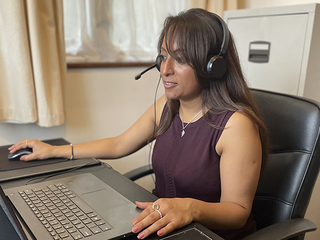Active monitoring for myelofibrosis (MF)
Some people with myelofibrosis don’t need treatment straight away. Instead they will have active monitoring, also known as watch and wait.
Active monitoring for lower risk myelofibrosis
When you are diagnosed with myelofibrosis (MF), your doctor will look at all your test results and calculate a risk score. This might be low risk, intermediate-1, intermediate-2 or high risk. The risk score helps doctors decide what treatment you should have, if any.
If you don’t have symptoms when you are diagnosed, and tests show that the MF is low risk or intermediate-1, then you may not need any treatment. You will have regular check-ups and a specialist doctor (a haematology consultant) and their team will be responsible for your care. This approach is called active monitoring or watch and wait.
Being on watch and wait is suitable for many people with a risk level that’s low or intermediate-1. There’s no advantage to treating the MF early if you don’t feel unwell, and it means you still have all the options available for when you really need treatment.
Taking aspirin to reduce your risk of blood clots
If you don’t have symptoms but are at risk of blood clots, your doctor may advise you to take a low daily dose of aspirin. This may seem odd as it is a commonly used over-the counter medicine, but it is an effective way of managing the risk of blood clots and the problems they can cause.

I should have been devastated when I was diagnosed with MF but it was OK. Being on watch and wait was tougher. Not having treatment came as quite a shock. Two years on, I realise it suits me fine.
- Mike, living with myelofibrosis since 2022
The emotional impact of active monitoring
For many people on watch and wait, although they feel well physically, knowing they have blood cancer but are not having treatment can have an emotional effect. So it’s important to be aware of this and look after yourself.
Many people feel confused and worried when they’re told they will just have check-ups. It’s hard to understand and explain to others how you can have cancer but not need treatment, or just be taking aspirin. It can also cause anxiety as your next check-up comes nearer and you wait for test results.
It might help to know you’re not alone – in the UK there are around 27,000 people with blood cancer who are on watch and wait. We have more information for people on active monitoring (watch and wait), including tips for coping emotionally. We also have a page on looking after yourself when you have myelofibrosis, which might help you feel more in control of your health.
You can contact our Support Service for emotional support or visit our online community forum to find about other people’s experiences and their advice about living on watch and wait.
What do check-ups for myelofibrosis involve?
Check-ups will include blood tests to monitor your blood counts (the number of each type of blood cell in your blood) and may involve a physical examination of your spleen – usually the doctor will feel your spleen gently to see if it is swollen.
Your doctor or nurse will ask if you have noticed any new symptoms. Keep a note of anything that’s bothering you or that feels different so you can tell them.
You can always call your hospital team in between check-ups if you are worried. Make sure you have contact details of a key worker (usually a specialist nurse) somewhere you can find them easily.
You may need check-ups less often if nothing changes and you carry on feeling well.

Worried about anything or have questions?
If you need someone to talk to, please don't hesitate to contact our Support Service by phone or email.
